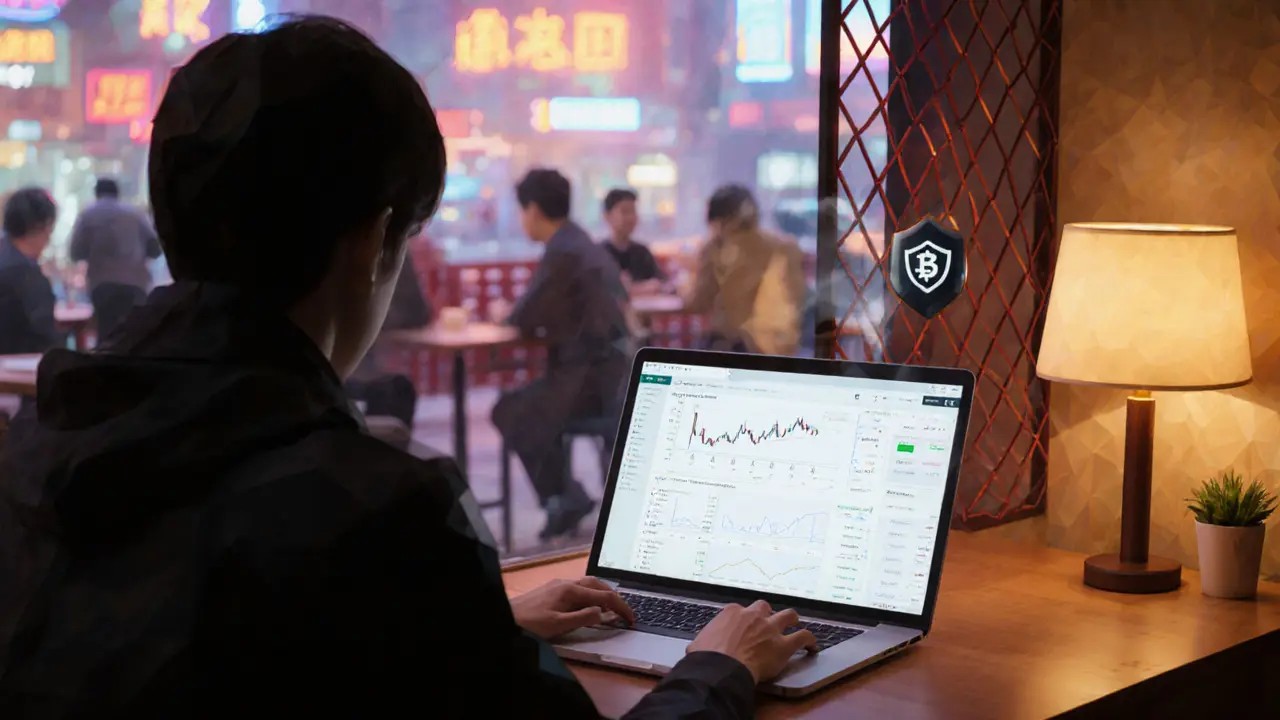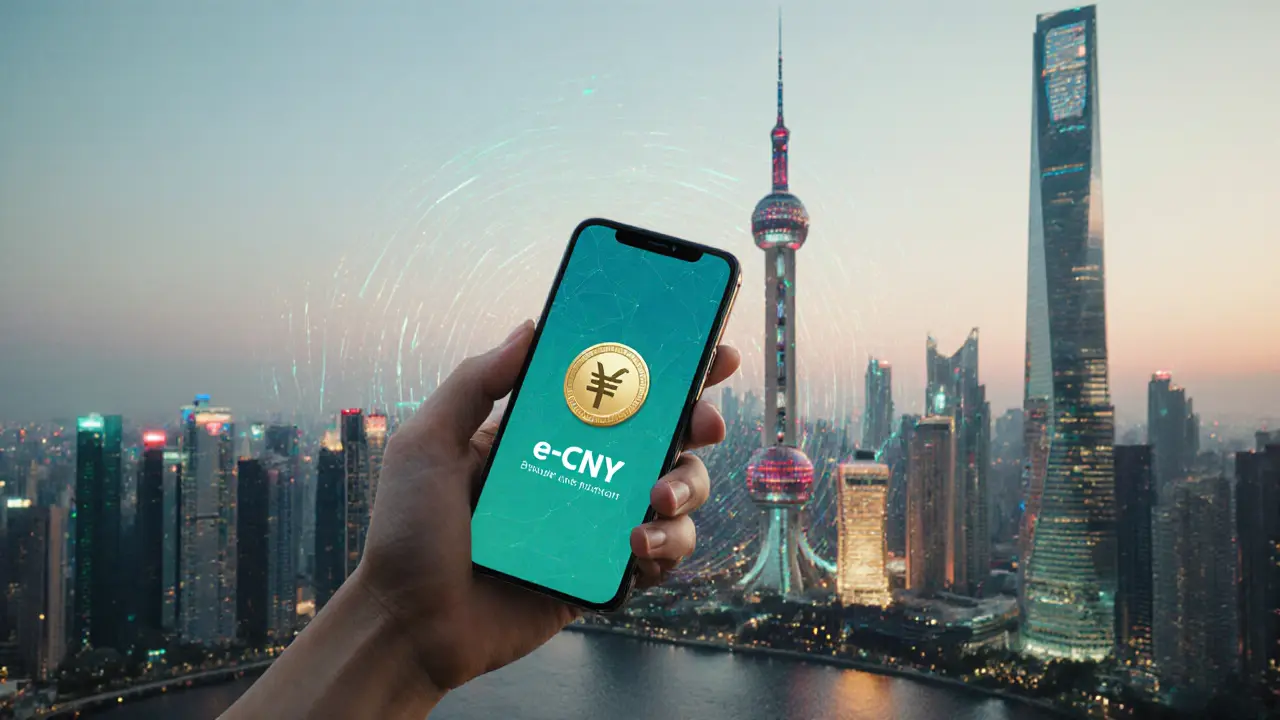China Crypto VPN Risks: Legal Consequences of Accessing Cryptocurrency via VPN

China Crypto VPN Risk Calculator
Enter Your Details
Risk Assessment Guide
Legal Basis: China's PBOC, NAFR, and CSRC regulations prohibit cryptocurrency trading as an illegal financial service. The Cyberspace Administration of China (CAC) actively monitors and blocks unauthorized VPN traffic.
Legal Risk Assessment
Risk Level:
Potential Consequences:
- Account freezing
- Administrative fines (5-10% of transaction amount)
- Device confiscation
Additional Information: The State Administration of Foreign Exchange (SAFE) prohibits capital outflows linked to crypto. Violations can lead to travel bans and asset seizure.
Imagine logging into an overseas crypto exchange from a Beijing coffee shop, only to have your internet cut off a few minutes later. That’s the reality for many Chinese residents trying to tap into the global crypto market using a VPN crypto China workaround. While a VPN can technically bypass the Great Firewall, the legal fallout can be severe - and it’s getting worse every year.
What a VPN Is and How It Works in China
Virtual Private Network (VPN) is a service that encrypts internet traffic and routes it through a server outside the user’s local network, effectively masking the user’s IP address and location. In mainland China, the VPN’s ability to tunnel through the Great Firewall makes it the most common tool for reaching blocked sites, including foreign crypto exchanges, social platforms, and news outlets.
China’s All‑Encompassing Crypto Ban
Cryptocurrency is a digital asset that uses cryptographic techniques for secure transactions, currently prohibited for trading, mining, and financial services in China. The ban, solidified in early 2025, outlaws token‑financing (ICO/IEO), exchange platforms, brokerage services, derivatives, and even advertising aimed at mainland users. While courts occasionally treat crypto holdings as “virtual assets” in civil disputes, that recognition does not translate into any permission to trade or transfer them.
Using a VPN to Reach Banned Exchanges
The technical pathway is simple: a user activates a VPN, selects a server in, say, Singapore, and then accesses Binance or another exchange as if they were abroad. The Great Firewall, managed by the Cyberspace Administration of China (CAC) the state body responsible for internet censorship and cybersecurity enforcement, constantly scans for VPN traffic signatures. Over the past two years, CAC has upgraded deep‑packet inspection tools, making it harder for non‑government‑approved VPNs to stay online for long periods.

Legal Landscape for VPN Use in China
Officially, the legality of VPNs varies by province. Some local authorities treat unregistered VPNs as illegal networking tools, while others turn a blind eye, especially for business travelers. The People’s Bank of China (PBOC) China’s central bank that governs monetary policy and supervises financial institutions and the National Administration of Financial Regulation (NAFR) the regulator that enforces financial market rules, including anti‑money‑laundering measures have issued joint notices demanding that telecom operators block unauthorized VPN services.
There are no widely reported arrests solely for using a VPN, but authorities have employed indirect pressure: shutting down cellular service, demanding police visits to reset phones, or confiscating devices until VPN apps are removed. These tactics signal that while a VPN might not be a crime in itself, it is a clear red flag when paired with prohibited financial activity.
Legal Risks of Crypto Activity via VPN
When a user not only bypasses the firewall but also conducts crypto trades, they breach multiple regulatory statutes:
- Financial Activity Ban: The PBOC, NAFR, and the China Securities Regulatory Commission (CSRC) classify crypto trading as an illegal financial service. Penalties range from hefty administrative fines (up to 10% of illicit gains) to criminal charges for “illegal fundraising” or “financial fraud.”
- Foreign Exchange Controls: The State Administration of Foreign Exchange (SAFE) prohibits capital outflows linked to crypto. Violations can lead to asset seizure and travel bans.
- AML/KYC Violations: Banks and payment processors must flag crypto‑linked transactions. Failure to report can trigger investigations by the Ministry of Public Security (MPS).
Given that a VPN user is simultaneously violating censorship rules (CAC) and financial regulations (PBOC, NAFR, CSRC), the legal exposure compounds. In practice, Chinese courts have confiscated crypto wallets, frozen bank accounts, and imposed criminal detention for large‑scale trading activities.
Combined Risk Profile: What You’re Really Facing
To illustrate the overlapping hazards, consider a typical scenario: a resident in Shanghai uses a commercial VPN to log into Binance, purchases $5,000 worth of Bitcoin, and transfers the proceeds to a foreign wallet. The risk breakdown is:
- VPN Detection: CAC may identify the VPN traffic and order the ISP to cut the connection, forcing the user to either uninstall the VPN or risk service interruption.
- Transaction Monitoring: Banks, bound by SAFE and PBOC directives, flag the foreign exchange movement and may freeze the linked bank account.
- Crypto Enforcement: NAFR and CSRC can issue an administrative penalty for unlicensed trading. If the amount exceeds certain thresholds, criminal prosecution is possible.
- Collateral Consequences: A criminal record can affect future travel, employment, and even digital identity verification for other services.
Because each regulatory body works in coordination, a single misstep can trigger an investigation that spirals across multiple agencies.

Practical Tips if You Still Choose to Use a VPN
We do not endorse illegal activity, but for readers seeking to understand risk mitigation, here are some precautionary steps:
- Choose Government‑Approved VPNs: Some enterprises are allowed to operate encrypted tunnels for business purposes. While not a loophole for personal crypto use, they are less likely to be blocked outright.
- Limit Transaction Size: Smaller trades (<$500) tend to escape immediate scrutiny. Large, repeated transfers raise AML red flags.
- Use Multi‑Factor Authentication (MFA): Secure your exchange accounts to reduce the chance of account takeover, which could accelerate law‑enforcement action.
- Avoid Storing Large Amounts Locally: Transfer crypto to hardware wallets and keep minimal on‑exchange balances.
- Stay Informed: Regulatory announcements from PBOC, NAFR, and CAC are often published on official portals; new restrictions can appear with little warning.
Even with these safeguards, the underlying legal framework remains hostile. The safest route is to avoid using crypto platforms altogether while residing in mainland China.
Comparison of Potential Penalties
| Violation Type | Regulating Agency | Typical Penalty | Criminal Risk? |
|---|---|---|---|
| Unregistered VPN (censorship breach) | Cyberspace Administration of China (CAC) | Service interruption, forced app removal, fines up to ¥5,000 | Low (usually administrative) |
| Crypto trading on unlicensed platform | People’s Bank of China (PBOC) & NAFR | Fines up to 10% of illicit gains, asset seizure | Medium (potential criminal charge for large sums) |
| Cross‑border crypto fund transfer | State Administration of Foreign Exchange (SAFE) | Account freeze, confiscation of transferred assets | Medium‑High (if linked to money‑laundering) |
| Repeated violations (VPN + crypto) | Multiple (CAC, PBOC, NAFR, MPS) | Combined administrative fines, possible detention (up to 2years) | High |
Looking Ahead: Will the Situation Change?
China’s push for the digital yuan (e‑CNY) suggests a long‑term strategy to keep financial power in state hands. The government continues to invest in advanced VPN‑detection algorithms and blockchain analytics capable of tracing cross‑border crypto flows. Analysts predict that any relaxation of crypto rules will be narrowly scoped-possibly allowing sandbox projects that align with the digital yuan’s ecosystem-but a full rollback of the ban is unlikely.
For expatriates or travelers, the safest approach remains using government‑approved communication tools and avoiding any direct crypto interaction while on Chinese soil. For residents, focusing on the growing e‑CNY infrastructure offers a legal digital‑payment avenue without the VPN‑related headaches.
Frequently Asked Questions
Is using a VPN illegal in China?
Technically, only VPNs that have been authorized by the government are legal. Unregistered VPNs are not criminalized across the whole country, but many provinces treat them as violations of internet‑censorship rules, leading to service blocks or fines.
Can I be arrested for trading crypto on an exchange accessed via VPN?
Yes. Trading on an unlicensed platform breaches the comprehensive crypto ban. Authorities can impose administrative penalties, freeze assets, and in serious cases, bring criminal charges for illegal fundraising or money‑laundering.
What happens if my VPN is detected while I’m using a crypto exchange?
The Great Firewall may cut your connection, your ISP could force you to uninstall the VPN app, and the exchange’s transaction may be flagged by financial regulators, leading to account closure or asset seizure.
Are there any VPN services that are safe for crypto trading in China?
No VPN can guarantee uninterrupted access for illegal crypto activities. Government‑approved VPNs exist for corporate use, but using them for personal trading still violates the crypto prohibition and can lead to penalties.
How does the digital yuan affect the need for crypto VPNs?
The e‑CNY offers a state‑backed digital payment method that works without VPNs. As its ecosystem expands, many consumers find a legal alternative for digital transactions, reducing the incentive to seek crypto via VPNs.

Jade Hibbert
October 12, 2025 AT 08:30Wow, so you’re basically telling us that using a VPN in China to trade crypto is like playing with fire, huh? Good thing I love fireworks. 😂
Just make sure you’ve got a backup plan if the Great Firewall decides to cut your internet, because nothing says “fun weekend” like a sudden police visit.
Anyway, stay safe and maybe consider a hobby that doesn’t involve potential jail time.
Hanna Regehr
October 15, 2025 AT 23:39If you're considering a VPN for crypto, the first step is to ensure the provider uses strong AES‑256 encryption and a no‑logs policy. That minimizes the chance that your traffic will be flagged by deep‑packet inspection tools. Also, keep transaction amounts under the radar; smaller trades are less likely to trigger the financial regulators.
Lena Vega
October 19, 2025 AT 14:49Keep it low‑key and avoid large transfers.
Laura Myers
October 23, 2025 AT 05:58Picture this: you’re sipping a latte in Beijing, the VPN lights up like a neon sign, and the next thing you know, the internet police are at your doorstep, demanding you uninstall that “dangerous” app. It’s the digital equivalent of a soap opera cliffhanger, except the drama doesn’t end with a kiss – it ends with confiscated devices and hefty fines. The stakes are higher than any reality TV show you’ve ever watched.
Carol Fisher
October 26, 2025 AT 20:08🇨🇳 🇺🇸 Nobody should be daring to undermine China’s sovereign laws for personal profit. If you think crypto is a free‑market miracle, think again – it’s a reckless gamble that disrespects our nation’s stability. 🙅♀️
Melanie Birt
October 30, 2025 AT 11:17Using an approved, government‑registered VPN can reduce the likelihood of immediate blocking, but it won’t shield you from the financial watchdogs. 🌐 Keep transaction sizes under $1,000, use multiple small hops, and always have a backup wallet that isn’t linked to the exchange. Remember, the safest crypto strategy in China is to stay offline. 😉
Lady Celeste
November 3, 2025 AT 02:27Another naïve soul thinking a VPN is a magic shield. Spoiler: it isn’t.
Ethan Chambers
November 6, 2025 AT 17:36Honestly, the obsession with circum venting Chinese regulations reveals a deeper insecurity about one’s own financial autonomy. If you truly believed in decentralization, you’d rather build your own blockchain than rely on a patched‑up VPN tunnel.
Rama Julianto
November 10, 2025 AT 08:46Look, using a VPN in china ain’t a joke. The authorities got AI that can sniff out encrypted traffic, so even “stealth” apps get caught. Keep your trades teeny‑tiny, use multiple accounts, and maybe think twice before you “get rich quick”.
Scott Hall
November 13, 2025 AT 23:55Sounds like a risky game, but if you’re set on it, make sure you have a solid emergency plan – like a prepaid phone that you can ditch if the network goes dark. And always keep a backup of your private keys offline.
Leynda Jeane Erwin
November 17, 2025 AT 15:05In view of the prevailing regulatory framework, it would be prudent to refrain from employing unauthorized VPN services for cryptocurrency transactions. On the other hand, if one insists on proceeding, adopting a multi‑layered obfuscation strategy could marginally mitigate exposure, though no approach guarantees absolute safety.
Brandon Salemi
November 21, 2025 AT 06:14Don’t let the thrill of crypto blind you – the real drama unfolds when the authorities knock on your door.
Siddharth Murugesan
November 24, 2025 AT 21:24People keep babblin about “privacy” while ignore the fact that the govnnment can just raid your phone tomorrow. It's a fool's game.
Daron Stenvold
November 28, 2025 AT 12:33Engaging in cryptocurrency transactions via an unauthorized virtual private network within the People's Republic of China presents a convergence of multiple statutory violations that merit careful consideration. The People's Bank of China, together with the National Administration of Financial Regulation, explicitly categorizes crypto‑related trading as an illegal financial service, thereby subjecting participants to administrative fines that may reach ten percent of the illicit transaction value. Concurrently, the Cyberspace Administration of China maintains an active surveillance regime, employing deep‑packet inspection technologies capable of detecting anomalous VPN traffic patterns. When such traffic is identified, internet service providers are mandated to terminate the connection and report the activity to the Ministry of Public Security. The Ministry, in turn, possesses the authority to initiate criminal investigations under statutes pertaining to illegal fundraising and financial fraud. Should the investigation substantiate the alleged misconduct, defendants may face detention, asset seizure, and, in severe cases, criminal prosecution carrying imprisonment terms. Moreover, the State Administration of Foreign Exchange imposes stringent controls on capital outflows, meaning that any conversion of crypto assets into foreign currency can trigger travel bans and additional financial restrictions. From a practical standpoint, users often overlook the requirement to maintain comprehensive records of their crypto holdings, which the authorities can compel through subpoenas. Failure to produce such documentation can exacerbate penalties and result in further legal jeopardy. It is also advisable to recognize that device confiscation is a documented outcome in several jurisdictional precedents, wherein law enforcement agents seize smartphones and computers to extract cryptographic keys. In light of these multilayered risks, the adoption of a risk‑mitigation strategy should prioritize the avoidance of prohibited activities altogether. If a user nonetheless elects to proceed, employing a government‑approved VPN-albeit limited to business use-may marginally reduce detection likelihood, though it does not confer immunity from financial regulation enforcement. Additionally, segmenting transactions into multiple sub‑threshold amounts can diminish the probability of triggering automated monitoring systems. Finally, maintaining an offline, hardware‑based cold wallet for long‑term storage of digital assets remains the most robust safeguard against both regulatory intrusion and cyber‑theft.
hrishchika Kumar
December 2, 2025 AT 03:42Imagine the digital dance-a lantern-lit alley in Shanghai, a whisper of code slipping through the firewall, and the glittering promise of decentralized gold. Yet, every step is watched by unseen eyes, turning that romance into a high‑stakes chase.
ചഞ്ചൽ അനസൂയ
December 5, 2025 AT 18:52Life’s like a river that tries to find the sea, but sometimes the dam of policy forces you to carve a new channel. Using a VPN is just one of those tiny canals people dig when the main flow is blocked.
Orlando Lucas
December 9, 2025 AT 10:01Reading the legal breakdown feels like a deep‑sea dive-lots of pressure, but the air pockets of understanding keep us afloat. It’s a reminder that knowledge is the best tool, even if it doesn’t guarantee safety.
Philip Smart
December 13, 2025 AT 01:11Yeah, sure, just read the fine print and don’t get caught. Simple as that.
Jacob Moore
December 16, 2025 AT 16:20Keep your head up, stay informed, and remember that the crypto community thrives on helping each other out. If you need resources, there are plenty of guides that focus on staying under the radar.
Manas Patil
December 20, 2025 AT 07:30From a fintech perspective, leveraging a VPN for cross‑border crypto liquidity introduces layers of compliance risk, especially under AML/KYC frameworks enforced by the PBOC and SAFE. The operational exposure can be quantified via a risk matrix, factoring in packet inspection likelihood, transaction volume, and jurisdictional enforcement intensity.